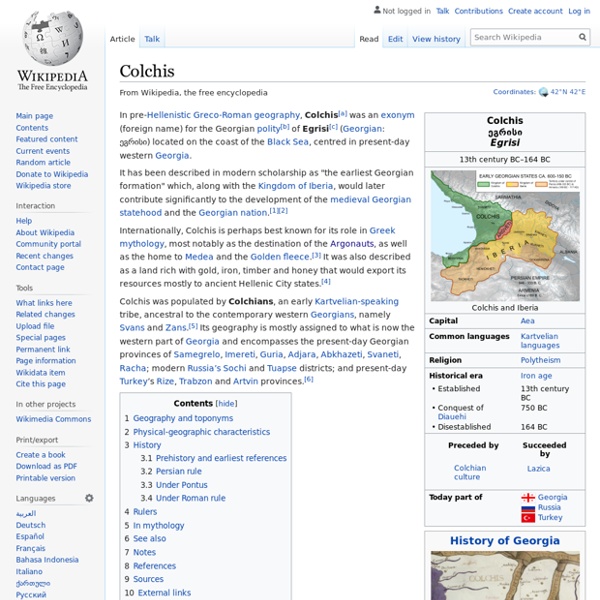Trojan War
Mythological war Whether there is any historical reality behind the Trojan War remains an open question. Many scholars believe that there is a historical core to the tale, though this may simply mean that the Homeric stories are a fusion of various tales of sieges and expeditions by Mycenaean Greeks during the Bronze Age. Those who believe that the stories of the Trojan War are derived from a specific historical conflict usually date it to the 12th or 11th century BC, often preferring the dates given by Eratosthenes, 1194–1184 BC, which roughly correspond to archaeological evidence of a catastrophic burning of Troy VII,[4] and the Late Bronze Age collapse. Sources
Calydon
Greek city in ancient Aetolia The Laphrion sanctuary plateau of Calydon with Varasova mountain on the background. Calydon or Kalydon (; Ancient Greek: Καλυδών) was a Greek city in ancient Aetolia, situated on the west bank of the river Evenus, 7.5 Roman miles (approx. 11 km) from the sea.[1] Its name is most famous today for the Calydonian Boar that had to be overcome by heroes of the Olympian age. Mythology[edit]
Helen of Troy
Daughter of Zeus in Greek Mythology Elements of her putative biography come from classical authors such as Aristophanes, Cicero, Euripides, and Homer (in both the Iliad and the Odyssey). Her story reappears in Book II of Virgil's Aeneid. In her youth, she was abducted by Theseus.
Aetolia
Region of Ancient Greece Aetolia (Greek: Αἰτωλία, romanized: Aἰtōlía) is a mountainous region of Greece on the north coast of the Gulf of Corinth, forming the eastern part of the modern regional unit of Aetolia-Acarnania. Geography[edit] The Achelous River separates Aetolia from Acarnania to the west; on the north it had boundaries with Epirus and Thessaly; on the east with the Ozolian Locrians; and on the south the entrance to the Corinthian Gulf defined the limits of Aetolia.
Paris
Capital of France Place in Île-de-France, France Paris (French pronunciation: [paʁi] ( listen)) is the capital and most populous city of France, with an estimated population of 2,148,271 residents as of 2020, in an area of 105 square kilometres (41 square miles).[1] Since the 17th century, Paris has been one of Europe's major centres of finance, diplomacy, commerce, fashion, science and arts. The City of Paris is the centre and seat of government of the Île-de-France, or Paris Region, which has an estimated official 2020 population of 12,278,210, or about 18 percent of the population of France.[1] The Paris Region had a GDP of €709 billion ($808 billion) in 2017.[4] According to the Economist Intelligence Unit Worldwide Cost of Living Survey in 2018, Paris was the second most expensive city in the world, after Singapore, and ahead of Zürich, Hong Kong, Oslo and Geneva.[5] Another source ranked Paris as most expensive, on a par with Singapore and Hong Kong, in 2018.[6][7] Etymology[edit]
Laocoön
Trojan priest in Greek and Roman mythology Laocoön (;[1][2][Note 1] Ancient Greek: Λαοκόων, IPA: [laokóɔːn]), the son of Acoetes, is a figure in Greek and Roman mythology and the Epic Cycle.[3] He was a Trojan priest who was attacked, with his two sons, by giant serpents sent by the gods. The story of Laocoön has been the subject of numerous artists, both in ancient and in more contemporary times. Death[edit]
Medea
She aids Jason in his search for the Golden Fleece out of love, assisting him with her magic and saving his life in several quests, playing the role of an archetypal helper-maiden, before abandoning her native Colchis, marrying him, and fleeing with him westwards where they eventually settle in Corinth. Euripides' 5th century BC tragedy Medea, arguably the best known adaptation of the Medea myth, depicts the ending of said union with Jason, when after ten years of marriage, Jason abandons her to wed the king's daughter Creusa while Medea and her sons by Jason are to be banished from Corinth. In revenge, she murders Creusa and the king with poisoned gifts, and later murders her own sons by Jason before fleeing for Athens,[2] where she eventually marries king Aegeus. Other traditions mention several other causes of death for Medea's sons. Genealogy and divinity[edit]
Oeneus
Oeneus was a king of the area of Calydon in Greek mythology, son of King Porthaon and Queen Euryte. He married Althaea, with whom he had a number of children, including Deianeira, Meleager, Toxeus, Clymenus, Periphas, Gorge, Eurymede, Perimede and Melanippe. When Artemis sent a huge boar, called the Calydonian Boar, in his lands to ravage them because he had forgotten to honour the goddess, Oeneus asked his son Meleager to gather a party of heroes to kill the creature. The party consisted of Meleager, Atalanta, and Meleager's uncles; Atalanta played a major role in successfully hunting down and killing the boar. When the time came to give the boar's skin as a prize, Meleager gave it to Atalanta, despite the protests of his uncles who believed it should be theirs by right of birth.
Europa
From Wikipedia, the free encyclopedia Jump to navigationJump to search Europa may refer to: Places[edit] Astronomical locations[edit] Buildings and structures[edit]
Oeneus
This article uses HTML markup. Please help by changing HTML markup to Wiki markup where appropriate. For help finding or replacing the problematic tags, see instructions. (February 2019) Ancient Greek mythical king Family



